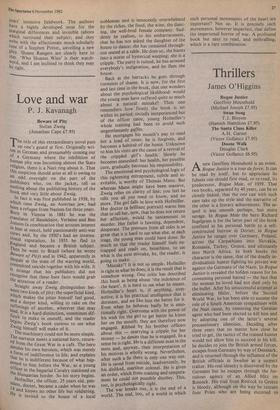Love and war
P. J. Kavanagh
Beware of Pity Stefan Zweig (Jonathan Cape £7.95)
The title of this extraordinary novel puts up one's guard at first. Originally wri- ten in German and presumably coming out of a Germany where the inhibition of human pity was becoming almost the State religion, there is a Nazi ring about it. That this suspicion should arise at all is owing to an odd oversight on the part of the Publishers who, on the jacket, tell us nothing about the publishing history of the book and very little about Zweig.
In fact it was first published in 1938, by which time Zweig, an Austrian jew, had been a refugee from Nazism for three years. Born in Vienna in 1881 he was the
translator of Baudelaire, Verlaine and Ben Ionson (a combination that arouses interest In him at once), held passionately anti-war
views and, by the 1930's had an interna- tional reputation. In 1935 he fled to Then and became a British subject.
Beware he went to Brazil (where he wrote of Pity) and in 1942, apparently in despair at the state of the warring world, F°rnin.itted suicide together with his wife. It IS strange that his publishers did not recognise that these bare facts would grab the attention of a reader.
Straight away Zweig distinguishes bet- ween two kinds of pity: the superficial kind, which makes the pitier himself feel good, and a deeper kind, willing to take on the sufferings of another, wherever that may lead. It is a hard distinction, sometimes dif- ficult to make in oneself, and the reader begins Zweig's book curious to see what Zweig himself will make of it.
The machinery could not be more simple. The narrator meets a national hero, return- ed from the Great War in a cafe. The hero derides his own heroism, which was merely a form of indifference to life, and explains that he is indifferent because of what hap- Peoed to him before the War, as a young officer in the Imperial Cavalry stationed on The Hungarian border. So his story begins. . Hofmiller, the officer, 25 years old, pen- l',Idess, decent, became a cadet when he was '4 and knows no other life but soldiering. He is invited to the house of a local
nobleman and is innocently overwhelmed by the riches, the food, the wine, the danc- ing, the well-bred female company. Sud- denly he realises, to his embarrassment, that he has not asked the daughter of the house to dance; she has remained through- out seated at a table. He does so, she bursts into a storm of hysterical weeping; she is a cripple. The party is ruined, he has aroused everybody's indignation, and he flees the house.
Back at the barracks he goes through torments of shame. It is now, for the first and last time in the book, that one wonders about the psychological likelihood: would the young man have suffered quite so much about a natural mistake? Then one remembers how firmly the book is set within its period: socially inexperienced but of the officer caste, young Hofmiller's whole training had been to avoid such ungentlemanly gaffes. He mortgages his month's pay to send her a load of roses; he is forgiven, and becomes a habitue of the house. Unknown to him his visits are the cause of a revival of the crippled girl's health. Slowly he becomes enmeshed: her health, her possible cure, gradually becomes his responsibility.
The emotional and psychological logic of this tightening entrapment, subtle and in- evitable, is worthy of Thomas Mann. But whereas Mann might have been massive, Zweig relies on clarity of line; you feel he tells you all you need to know, and no more. The girl falls in love with Hofmiller. Her doctor (a brilliant portrait) warns him that to tell her, now, that he does not return her affection, would be tantamount to murder. Her father is fawning, dependent, desperate. The pressure from all sides is so great that it is hard to see what else, at each stage, the young man could have done. So much so that the reader himself feels en- trapped and reads on, breathless, to see what is the next mistake, he, the reader, is going to make.
`Mistake'? It is not so simple. Hofmiller is right in what he does; it is the result that is somehow wrong. One critic has described this book as being about 'the indolence of the heart'. It is hard to see what he meant. Hofmiller's heart is, if anything, over- active; it is his practical intelligence that is dormant, and we like him the better for it. Even when he behaves badly he is emo- tionally right. Overcome with the power of his wish for the girl to get better he kisses her on the mouth; they are therefore now engaged. Ribbed by his brother officers about this — marrying a cripple for her money — he denies that he is engaged. In a sense he is right. He is a different man in the mess and, anyway, their interpretation of his motives is wholly wrong. Nevertheless, after such a lie there is only one way out. He is saved from suicide, inadvertently, by his disliked, martinet colonel. He is given an order, which from training and tempera- ment he could not possibly disobey. This, too, is psychologically right. The war breaks out, it is the end of a world. The end, too, of a world in which such personal movements of the heart are important? Not so. It is precisely such movements, however imperfect, that define the impersonal horror of war. A profound book but easy to read, and enthralling, which is a rare combination.














































 Previous page
Previous page